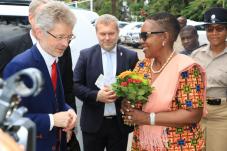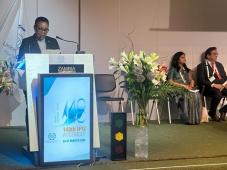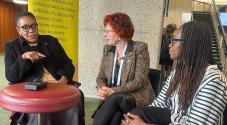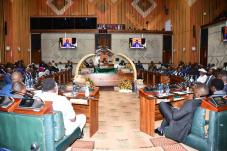Speaker of the National Assembly, The Right Honourable Dr Patrick Matibini, SC, BA, FCIArb, MP has called on world Parliaments at all levels to play a strategic role in order to enhance accountability systems that are key to the implementation of global and regional commitments.
Dr Matibini made this call on Tuesday, 14th October, 2019 at the ongoing 141st Assembly and Related Meetings of the Inter Parliamentary Union (IPU) in Belgrade, Serbia. The Speaker said that, in order to strengthen international law and to enhance parliamentary roles and mechanisms, there was need for parliaments to perform country-level evaluations regarding how well equipped they were, institutionally and operationally, before they implement global commitments.
Dr Matibini said that the Parliamentary roles and mechanisms for strengthening International Law hinges on the notion of the Rule of Law, which constitutes the basis of the legal order within which legislative sovereignty must be located and defined.
“There were signals that the world today expects from national, regional and international institutions to thoroughly self-assess themselves with a view to reinforcing their accountability mechanisms”, said Speaker Matibini.
Dr Matibini added that the common law that all Parliamentarians now agree to holds the existence of a free and democratic society as its basic tenet and is built on two complementary principles, namely, the operation of a democratic legislature and the operation of independent courts. He noted that the supremacy of the rule of law required recognition of a fundamental division of sovereignty and added that the role of IPU in advancing this canon therefore cannot be doubted.
The Speaker also noted that the current international legal order and its legally-binding framework of global commitments had continued to constitute the global bedrock for peace and security. He therefore urged the gathering of Parliamentarians to work collectively in their individual jurisdictions, to avoid the violations of this Legal Order for which may be recipe for global and nation-level conflict and insecurity, which may result in significant suffering of the peoples.
He challenged the Parliamentarians to reiterate their solemn commitment to the principles of global commitments, which included those pertaining to the UN Charter and international peace and justice as guided by the rule of law. Dr Matibini further stated that the UN also had a role to play in capacity enhancement to secure global compliance with international law. He added that the strengthening of positive cooperation and collaboration between the UN system and national parliaments, through the IPU, was, therefore, merited.
Dr Matibini added that regional cooperation had an important role in the enhancement of the international legal order especially with respect to contribution to peaceful settlement of disputes as well towards the realisation of the global developmental Agenda. He reiterated that regional and sub-regional cooperation in Africa had remained a fountain of hope for continental peace and security. He cited strengthening parliamentary oversight over the implementation of commitments towards Sustainable Development Goals (SDGs) and the African Union’s Agenda 2063 which were particularly fundamental in this regard.
The 141st Assembly and Related Meetings of the IPU was opened by President of Serbia, His Excellency Aleksandar Vučić on Sunday 13th October 2019 at Sava Conference Centre in Belgrade, Serbia. The Assembly has attracted over 179 world parliaments with over 1700 delegates in attendance. Serbia was one of the first members of the IPU, joining in 1891, shortly after the organization was founded in 1889. This is the second time that Belgrade has hosted an IPU Assembly; the 52nd Assembly was held in Belgrade in 1963.
The IPU Assembly is the largest gathering of parliamentarians who meet twice a year. This year, the IPU celebrates 130 years since its founding in 1889. Since its founding, it has perfected its skill-set towards the enhancement of the rule of law and peaceful resolution of conflict.



